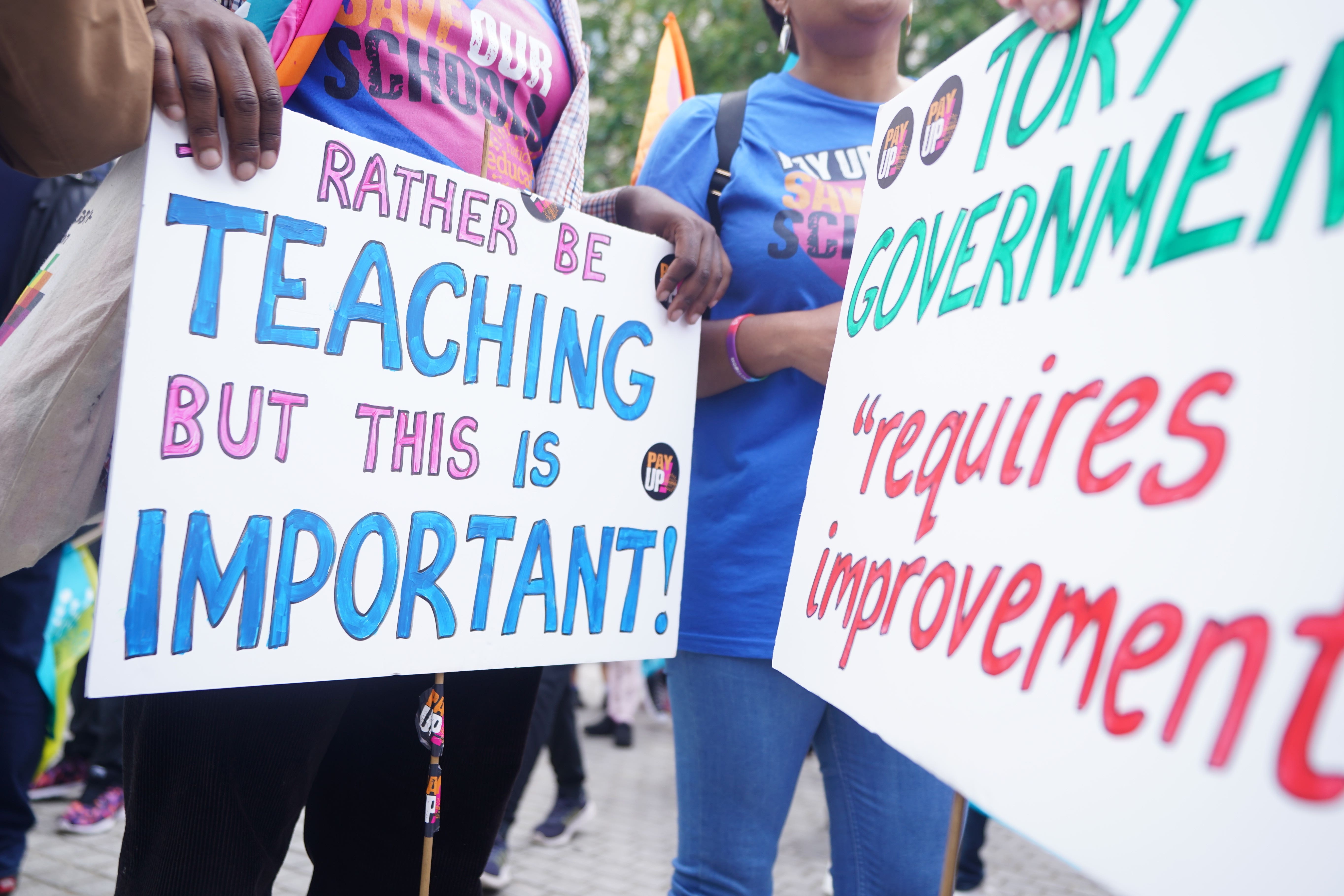Teaching union members back strike action over pay in indicative ballot
The National Education Union will decide next steps over pay and funding at its annual conference in Bournemouth next week.

Your support helps us to tell the story
From reproductive rights to climate change to Big Tech, The Independent is on the ground when the story is developing. Whether it's investigating the financials of Elon Musk's pro-Trump PAC or producing our latest documentary, 'The A Word', which shines a light on the American women fighting for reproductive rights, we know how important it is to parse out the facts from the messaging.
At such a critical moment in US history, we need reporters on the ground. Your donation allows us to keep sending journalists to speak to both sides of the story.
The Independent is trusted by Americans across the entire political spectrum. And unlike many other quality news outlets, we choose not to lock Americans out of our reporting and analysis with paywalls. We believe quality journalism should be available to everyone, paid for by those who can afford it.
Your support makes all the difference.Teachers represented by the National Education Union have voted in support of strike action in an indicative ballot over pay and funding.
An overwhelming majority of National Education Union (NEU) teacher members in England and Wales who took part in the preliminary ballot said they would strike to secure an above-inflation pay rise and further funding for staffing.
More than half of NEU teacher members – over 150,000 – in state schools and sixth forms in England and Wales took part in the preliminary electronic ballot.
The result demonstrates the mass discontent within our profession to which the Government should take notice. Urgent steps are required to tackle the crisis in education and our members know this
The ballot, which launched on March 2 and closed on Thursday, asked teacher members if they would vote “yes” to strike action for a fully funded, above-inflation pay rise and further funding to provide improved levels of staffing provision.
The NEU, the largest education union in the UK, has said it will consider next steps at a special executive meeting on Tuesday.
Any appropriate recommendations will be put to the union’s annual conference in Bournemouth next week and voted on by delegates in the subsequent days.
The union consulted 300,000 of its teacher members working in maintained schools and sixth forms across England and Wales as part of the ballot.
In England – where 50.3% of members turned out to vote – more than nine in 10 (90.3%) of those who took part in the survey said they would vote yes to strike action for a fully funded, above-inflation pay rise and improved funding.
In Wales – where 54.1% of teacher members turned out to vote – 87.2% said they would vote yes to strike action over pay and funding.
Nearly two-in-three (65.3%) members in Wales who took part in the indicative ballot also said they would support strike action if the Welsh Government reduced the summer break to four weeks.
Daniel Kebede, general secretary of the NEU, said: “This is an indicative, and not a formal ballot.
“But the facts speak for themselves; over half of our members voted in the ballot and overwhelmingly supported a move to a formal ballot to secure a fully funded, above-inflation pay rise which constitutes a meaningful step towards pay restoration.
Further strike action would cause more disruption to pupils who have already lost over 25 million school days due to last year’s industrial action
“The result demonstrates the mass discontent within our profession to which the Government should take notice.
“Urgent steps are required to tackle the crisis in education and our members know this.
“Our annual conference gathers in Bournemouth next week and delegates will determine the next steps in our pay and funding campaign.”
The NASUWT union has also been consulting its members in recent weeks to gauge whether they would be interested in taking industrial action on pay, workload, working hours and well-being.
The results of the NASUWT’s consultative ballot are expected to be announced at their annual conference in Harrogate in Yorkshire over the Easter weekend.
Last month, the Department for Education (DfE) said in evidence to the School Teachers’ Review Body (STRB) that teachers’ pay awards should “return to a more sustainable level” after “two unprecedented years”.
The independent School Teachers’ Review Body is currently considering evidence for this year’s pay award, unions should engage with this process instead of striking before they even know what the pay recommendations are
In July last year, the Government agreed to implement the STRB’s recommendation of a 6.5% increase for teachers in England, and co-ordinated strike action by four education unions was called off.
A DfE spokesperson said: “The independent STRB is currently considering evidence for this year’s pay award, unions should engage with this process instead of striking before they even know what the pay recommendations are.
“It is therefore extremely disappointing that the NEU has voted to proceed with a formal ballot for industrial action.
“Further strike action would cause more disruption to pupils who have already lost over 25 million school days due to last year’s industrial action.
“Overall school funding is rising to over £60 billion in 2024/25, its highest ever level in real terms per pupil – and teachers have already benefited from two historic pay awards totalling over 12% in just two years.”